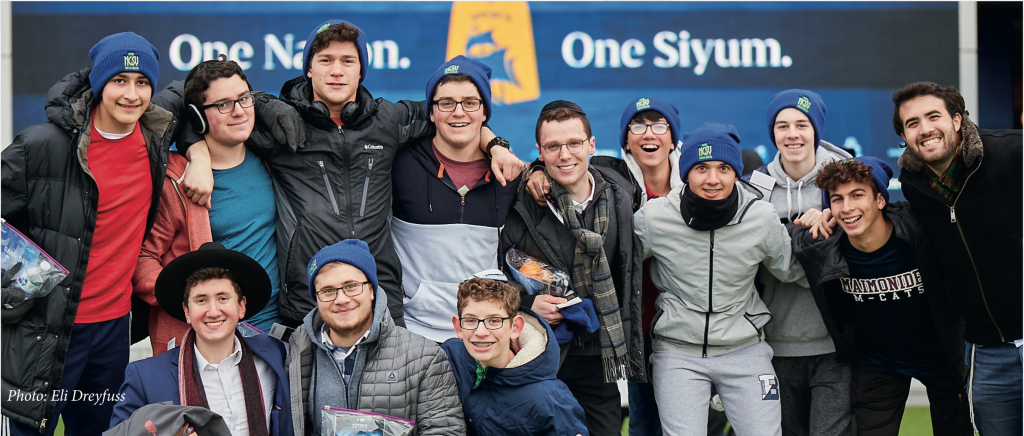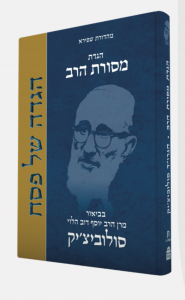Inside the OU – Spring 2020
HAPPENINGS AROUND THE OU
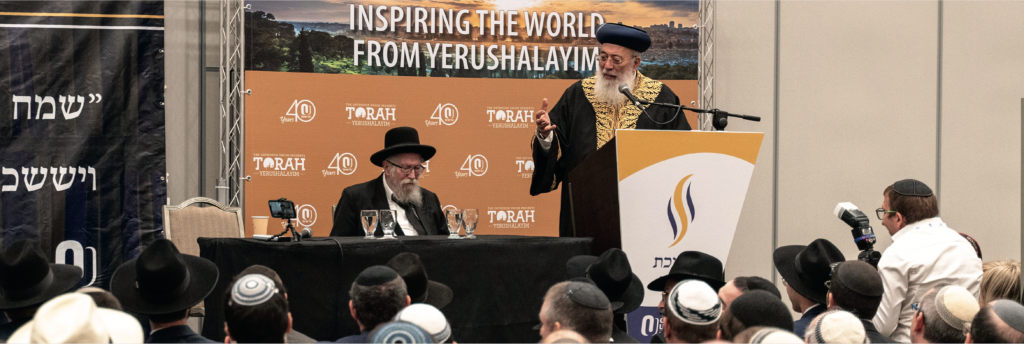
Rabbi Shlomo Amar, former Sephardic Chief Rabbi of Yerushalayim, with Rabbi Zalman Nechemia Goldberg, Av Beit Din of the Beit Din of Yerushalayim (seated), addressing Semichas Chaver participants at the siyum held at OU Israel’s Torah Yerushalayim event in October. Photo: Moshe Biton
Semichas Chaver: The Newest Revolution in Torah Learning
This past November, the OU’s Semichas Chaver Program (SCP), an innovative learning initiative, opened twenty-eight new locations in the US, as well as in Canada, Israel, Australia and the United Kingdom, bringing the total number of locations to fifty-three worldwide, and welcoming more than 700 new participants.
Founded in 2017 by Rabbi Elyada Goldwicht, SCP is a fast-paced, interactive learning program for men with a focus on the practical meaning of halachah. Each shiur includes thought-provoking questions and a dedicated segment on the philosophical underpinnings of a given topic. Upon completion of each topic and the successful passing of a written exam, every member receives a certificate signed by Rabbi Hershel Schachter, OU Posek and Rosh Yeshivah at YU’s Rabbi Isaac Elchanan Theological Seminary; Rabbi Shlomo Amar, former Sephardic Chief Rabbi of Yerushalayim; and Rabbi Zalman Nechemia Goldberg, Av Beit Din of the Beit Din of Yerushalayim.
To learn more about SCP, or to find a program near you, visit semichaschaver.com.
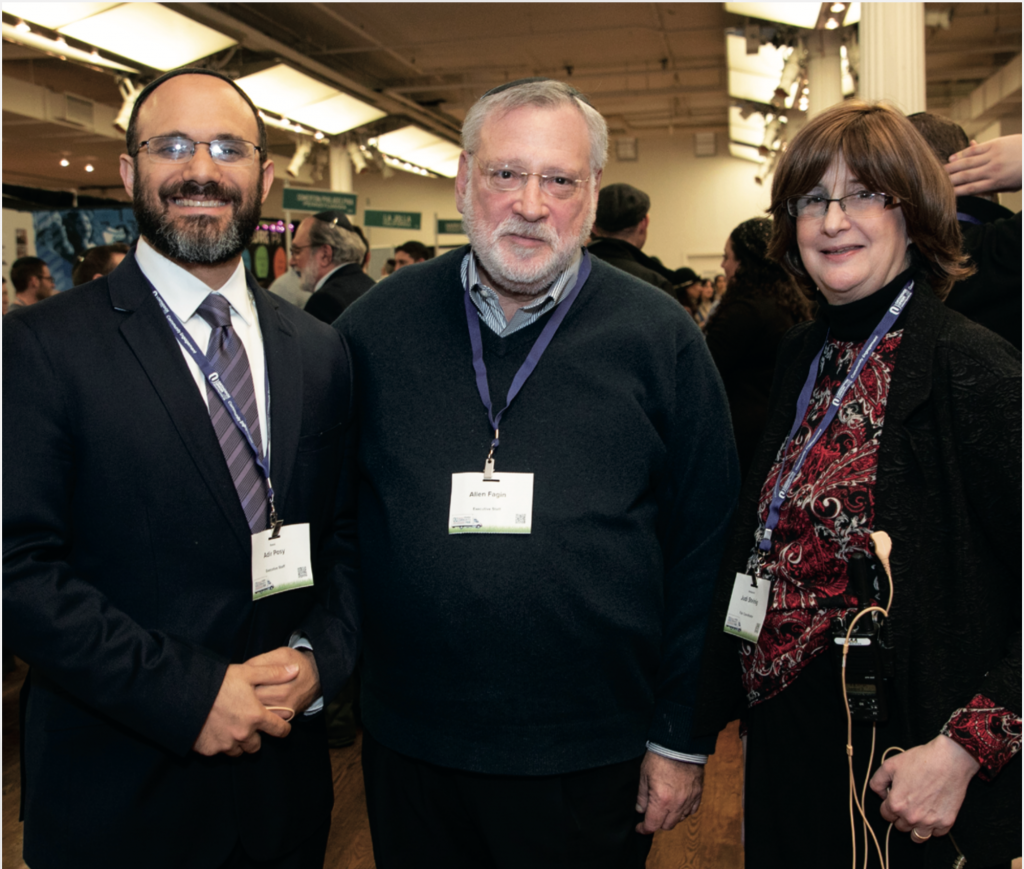
From left: Pepa and Rabbi Joseph Karasick Department of Synagogue and Community Services Director Rabbi Adir Posy; OU Executive Vice President Allen Fagin; and Director, Community Programs/Fair Coordinator Rebbetzin Judi Steinig at the fair. Photo: Zush Photography
Communities Fair a Smashing Success
Each of these communities share . . . the desire to grow in an environment rich in educational facilities, active synagogue life and a supportive communal infrastructure. It was a matchmaking festival made in heaven. —Allen I. Fagin, OU Executive Vice President
Nearly 2,000 people attended the OU’s Seventh International Jewish Community Home and Job Relocation Fair this past November, showcasing a record-breaking sixty-three communities, representing nineteen US states and several Israeli cities. Attendees at the fair, held at the Metropolitan Pavilion in Manhattan, learned about the amenities, schools, local infrastructure and potential employment opportunities of the participating communities. Special workshops for first-time homebuyers as well as Nefesh B’Nefesh-sponsored sessions for those contemplating aliyah were offered as part of the program.
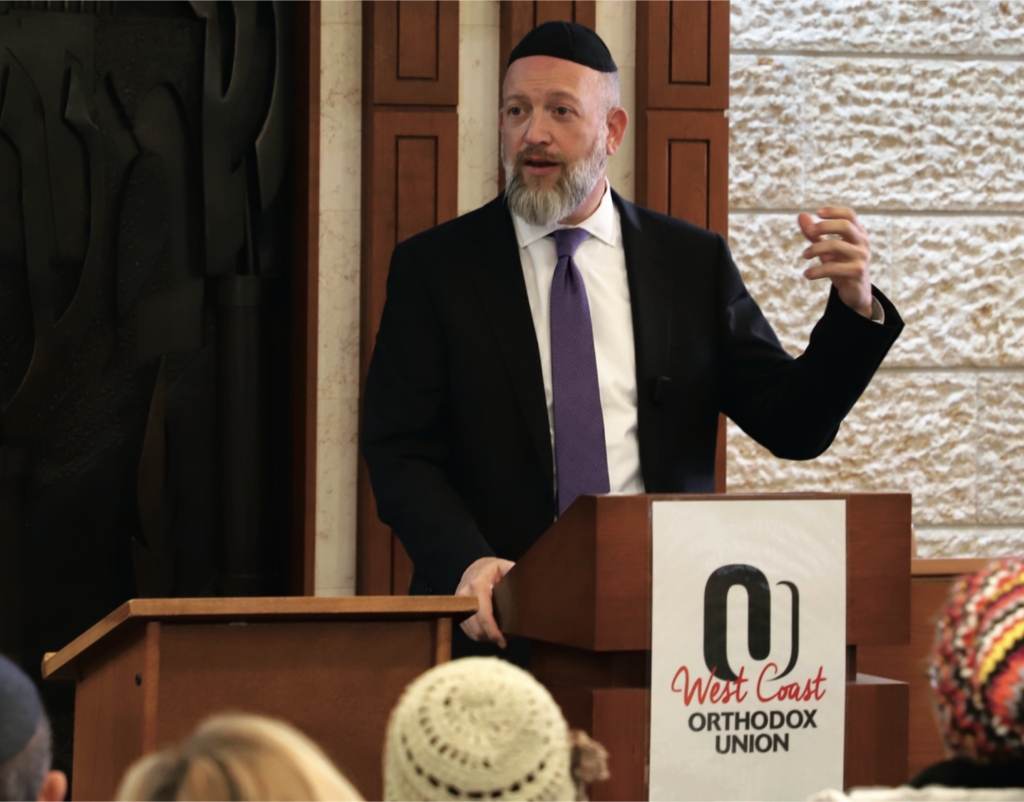
Rabbi Efrem Goldberg, Senior Rabbi of the Boca Raton Synagogue in Florida, speaking at Yeshiva University High School of Los Angeles (YULA) on Sunday morning during the Torah LA weekend. Courtesy of Lew Groner
Jewish Scholars Participate in Torah LA Weekend
In the span of just several months, the OU is proud to have hosted three communal-wide learning events—in Jerusalem and on both coasts in the US. —OU President Mark (Moishe) Bane
Eleven synagogues and four Jewish day schools brought together more than 3,500 community members for the OU’s annual Torah Los Angeles weekend. The four-day learning event featured inspiring Torah sessions delivered by a blue-ribbon list of scholars from across the country. Scholars included keynote speaker Rabbi Efrem Goldberg, Rabbi Hershel Schachter, Rabbi Dr. Tzvi Hersh Weinreb, Rabbi Steven and Rebbetzin Yael Weil and Rabbi Abraham and Rebbetzin Dr. Adina Shmidman, among others.
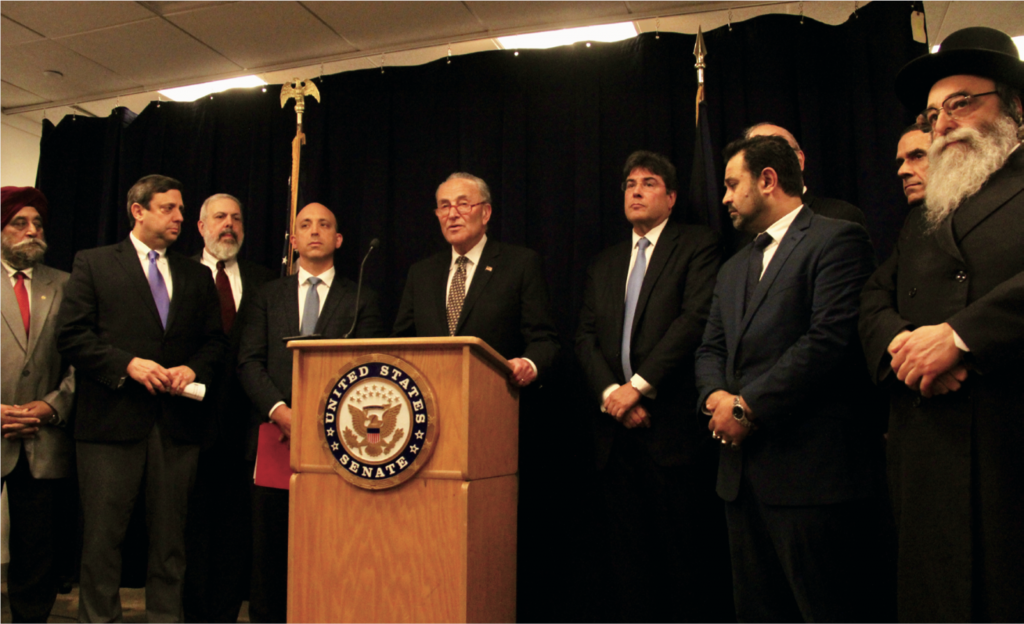
OU Advocacy Center Executive Director Nathan Diament (second from left) joins Senator Chuck Schumer and other leaders at a press conference in New York City on December 30.
Non-Profit Security Grant Boosted, Combating Anti-Semitism
Editor’s Note: This piece reflects NSGP funding as of January 2020; the situation is in flux as Congress seeks to address rising anti-Semitism.
In a landmark bipartisan decision on December 20, Congress increased funding for the federal Nonprofit Security Grant Program (NSGP) to $90 million. This represents a 50 percent increase compared to last year’s $60 million funding level, and will help keep America’s synagogues, Jewish day schools, and other houses of worship and nonprofits safe against terror attacks.
The NSGP provides grants of up to $100,000 to nonprofits so they can improve building security by acquiring and installing items ranging from fences, lighting and video surveillance to metal detectors and blast-resistant doors, locks and windows. The funding may also be used to train staff and pay for contracted security personnel.
The OU Advocacy Center helped spearhead the federal grant program in 2005 and works with members of Congress and other political leaders year-round to increase annual funding. The new allocation brings the total funding for the NSGP, since inception, to $419 million. The Department of Homeland Security, which administers the grant program, has disbursed grants to more than 4,000 institutions across the country.
Days after Congress approved the $90 million increase—and in the wake of several anti-Semitic attacks including at a Monsey home during Chanukah—OU Advocacy Center Executive Director Nathan Diament joined Senator Chuck Schumer at a press conference in New York City to call for quadrupling NSGP funding for 2020 to $360 million. Several other legislators have since joined this push, with Senators Chris Van Hollen and Ben Cardin and Representative John Sarbanes of Maryland speaking out at a January press conference in Baltimore alongside Mr. Diament.
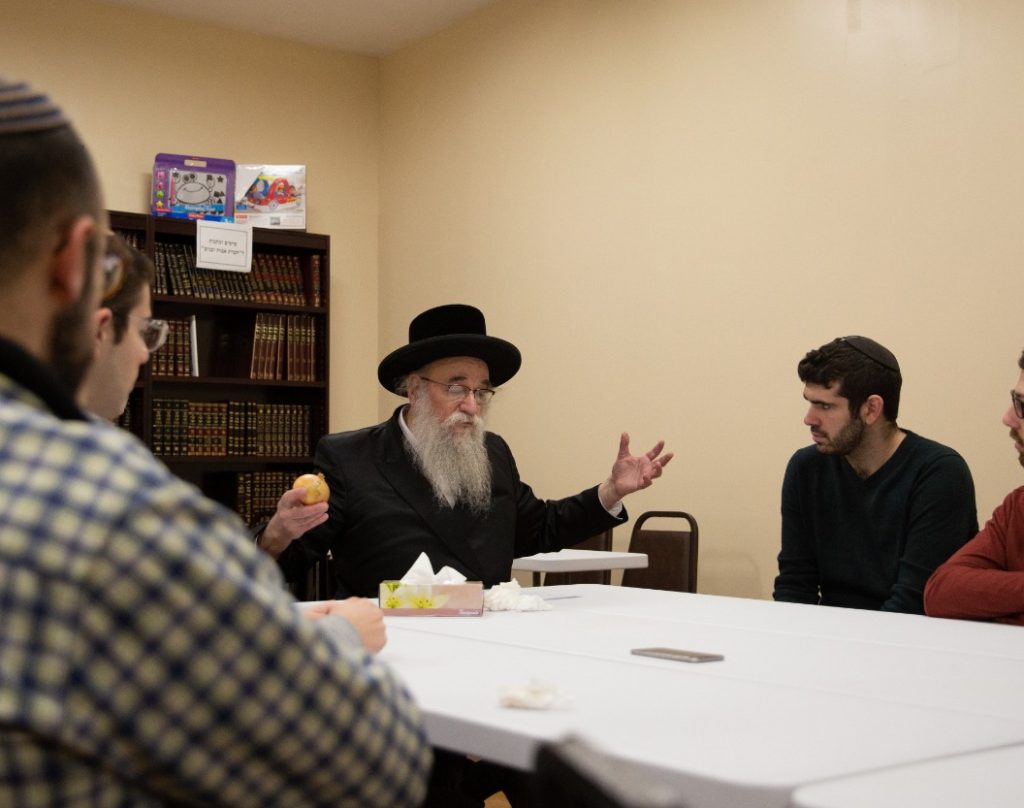
Rabbi Avraham Rubin, rav of the Satmar community in Jersey City, speaks with NYU students. Courtesy of Rabbi Joe Wolfson
Achdut in the Wake of Tragedy
In the aftermath of the tragic shooting at a kosher supermarket in Jersey City in December, Rabbi Joe Wolfson, OU-JLIC Educator at NYU, and fifteen of his students visited the close-knit Satmar Jewish community in Jersey City to show their support and express their grief. In addition to paying a shivah visit to store owner Moshe Ferencz, whose wife Leah Mindel was murdered, and visiting the widow of murdered store employee Douglas Miguel Rodriguez, the group met with Rabbi Avraham Rubin, the rav of the community.
The bullets didn’t just strike at individual Jews, but at all of Israel. —Rabbi Avraham Rubin
“Bnei Yisrael is compared to an onion . . . which is made of many layers . . . but has a common root,” said the Rav. “With you [college students] coming to visit [the Satmar community], we know that there is a common root that holds us all together, and that the bullets didn’t just strike at individual Jews, but at all of Israel.”
NCSYers Join Siyum HaShas
A joyous celebration of Daf Yomi kicked off NCSY’s annual premier learning program for public school teens, held in Long Branch, New Jersey in January. Three hundred and fifty NCSYers from regions across the US, as well as from Canada and Argentina, joined the 90,000 celebrants at MetLife Stadium in New York for the Thirteenth Global Siyum HaShas, marking the completion of the seven-and-a-half-year Daf Yomi cycle.
“There is nothing quite like the recognition for our teens that they are part of a massive world Jewish community as we all celebrate our shared connection to Torah and to one another. That came alive for them in a dramatic way at the Siyum,” said Rabbi Micah Greenland, NCSY International Director.
The five-day learning program, known as Aspire: NCSY Yarchei Kallah, is held annually in December. Parallel learning programs were run in Danbury, Connecticut and Chicago, Illinois.
Impact Accelerator Announces Second Cohort
Following a pitch night this past November by ten finalists in front of the Accelerator Board and OU senior leadership, four Jewish nonprofit ventures have been selected from over eighty applicants to join the OU Impact Accelerator’s Second Cohort. The non-profits are:
Daily Giving – enabling every Jew to easily perform the mitzvah of tzedakah every single day, this dollar-a-day initiative supports over forty deserving Jewish charities worldwide.
Communities Confronting Substance Abuse – bringing awareness, education and prevention programming regarding substance abuse and addiction to Jewish communities.
Ani Tefillah – producing a tefillah-enhancement curriculum that imbues prayer with deeper meaning for school-age children.
Chinuch Yehudi – educating the 750,000 to 1,000,000 Israelis in the United States about the critical importance of a Jewish day school education, and assisting parents in transferring their children to Jewish schools.
Acceptance into the OU Impact Accelerator invites these four ventures to participate in a cohort of Jewish nonprofit entrepreneurs addressing communal challenges. The six-month program is built on mentorship-based growth and early-stage funding.
To learn more, visit: ou.org/accelerator.
Advancing Communal Research
Since its inception in 2018, the OU Center for Communal Research (CCR) has been at the forefront of leading a conversation about the importance of research in the Jewish community. Director Matt Williams and Assistant Director Michelle Shain have been traveling around the country speaking on a variety to topics related to Jewish studies and social science. The department presented at NYU’s Religion and America Symposium, the American Academy of Religion’s Annual Meeting; and the Association for Jewish Studies Conference, to name a few.
WOMEN IN ACTION
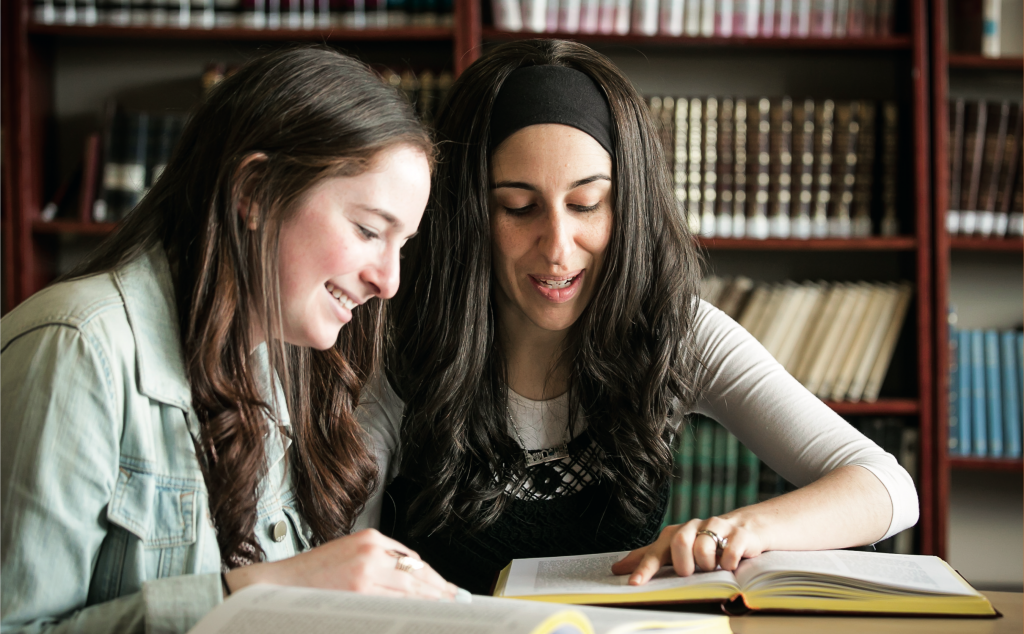 WI Launches “Torat Imecha” Nach Yomi Series
WI Launches “Torat Imecha” Nach Yomi Series
The OU (WI) recently launched “Torat Imecha,” a Nach Yomi learning initiative. This series, complementing the OU’s Shoshana Grossman Nach Yomi program, consists of a daily audio shiur on the books of Prophets (Nevi’im) and the Writings (Ketuvim) at the pace of a chapter a day. The shiurim, presented by women scholars and educators, are geared toward learners of all levels who would like to participate in the two-year study cycle. The series also includes an introductory video for each sefer in Nach, presented by noted international speaker Rabbanit Shani Taragin.
This series presents a world-class roster of female scholars who will teach Nach Yomi from their perspective, bringing nuance and erudition to the participants in these exciting new shiurim. —Allen Fagin, OU Executive Vice President
“Building on the overwhelming response to our Rosh Chodesh Initiative, and our Selichot, Shavuot and Simchat Torah programming, we are taking Torah learning to the next level,” said WI Director Rebbetzin Dr. Adina Shmidman. “We are creating Nach Yomi content by women to engage and inspire the community in a powerful way.”
Since its launch in January, over 4,600 participants from thirty-seven US states and twenty-six countries have signed up for the program, including Hong Kong, Peru and Serbia.
Torat Imecha is dedicated by Etta Brandman Klaristenfeld, Chair of the WI, in memory of her aunt Malka Nussbaum, Malka Esther Bat Tzvi Yoseph.
To subscribe to the series, visit: go.ou.org/tija.
NEW POSITIONS & PROMOTIONS
Welcome to . . .
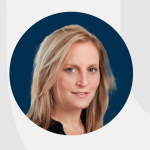 . . . Shari Weisenberg, Senior Director of Marketing, OU Marketing and Communications. Among other responsibilities, Shari will be charged with leading and servicing the marketing needs of NCSY. She brings over twenty years of marketing experience to the OU, having led product launches, global campaigns, content creation, social media and PR for media and technology companies such as Microsoft, Verizon, Sundance and NBC Universal. She holds a bachelor’s in communications from Boston University.
. . . Shari Weisenberg, Senior Director of Marketing, OU Marketing and Communications. Among other responsibilities, Shari will be charged with leading and servicing the marketing needs of NCSY. She brings over twenty years of marketing experience to the OU, having led product launches, global campaigns, content creation, social media and PR for media and technology companies such as Microsoft, Verizon, Sundance and NBC Universal. She holds a bachelor’s in communications from Boston University.
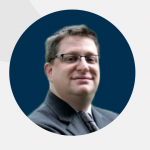 . . . Josh Berkman, Director of Communications, Teach Coalition. Josh Berkman comes to Teach Coalition with a wealth of experience in Jewish communal and private sector communications. Most recently, he was a vice president at Rubenstein Public Relations, where he implemented high-impact, media-driven communications programs for clients including the Simon Wiesenthal Center and the World Values Network. He has also spearheaded media relations and marketing for the Jewish Agency for Israel, American Jewish World Service and the American Jewish Joint Distribution Committee. Josh holds a bachelor’s from Northwestern University and a master’s in journalism from Columbia University.
. . . Josh Berkman, Director of Communications, Teach Coalition. Josh Berkman comes to Teach Coalition with a wealth of experience in Jewish communal and private sector communications. Most recently, he was a vice president at Rubenstein Public Relations, where he implemented high-impact, media-driven communications programs for clients including the Simon Wiesenthal Center and the World Values Network. He has also spearheaded media relations and marketing for the Jewish Agency for Israel, American Jewish World Service and the American Jewish Joint Distribution Committee. Josh holds a bachelor’s from Northwestern University and a master’s in journalism from Columbia University.
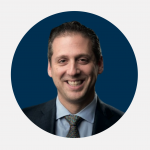 . . . Ari Greene, Director of Development, NCSY New York. Serving as a member of NCSY New York’s senior leadership team, Ari will lead the region’s fundraising campaigns and further its mission through development, community engagement and working collaboratively with all stakeholders. Ari has a strong background in recruiting, business development, relationship building and sales. He holds a bachelor’s in marketing from Yeshiva University.
. . . Ari Greene, Director of Development, NCSY New York. Serving as a member of NCSY New York’s senior leadership team, Ari will lead the region’s fundraising campaigns and further its mission through development, community engagement and working collaboratively with all stakeholders. Ari has a strong background in recruiting, business development, relationship building and sales. He holds a bachelor’s in marketing from Yeshiva University.
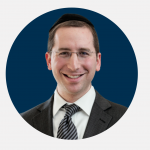 . . . Rabbi Shay Schachter, Rabbinic and Halachic Advisor, Yachad. Rabbi Schachter will provide ongoing religious guidance to Yachad, including deciding relevant halachic matters, enhancing the spiritual growth of Yachad participants, staff and volunteers, and helping develop religiously appropriate content for Yachad programming. He currently serves as the Rosh Bais Medrash at the Young Israel of Woodmere. Rabbi Schachter received rabbinic ordination from YU’s Rabbi Isaac Elchanan Theological Seminary, with additional ordination from Rabbi Asher Weiss of Jerusalem, and holds a master’s in Jewish education and administration from YU’s Azrieli Graduate School of Jewish Education.
. . . Rabbi Shay Schachter, Rabbinic and Halachic Advisor, Yachad. Rabbi Schachter will provide ongoing religious guidance to Yachad, including deciding relevant halachic matters, enhancing the spiritual growth of Yachad participants, staff and volunteers, and helping develop religiously appropriate content for Yachad programming. He currently serves as the Rosh Bais Medrash at the Young Israel of Woodmere. Rabbi Schachter received rabbinic ordination from YU’s Rabbi Isaac Elchanan Theological Seminary, with additional ordination from Rabbi Asher Weiss of Jerusalem, and holds a master’s in Jewish education and administration from YU’s Azrieli Graduate School of Jewish Education.
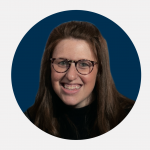 . . . Raquel Selevan, Director, Yachad New Jersey. While Raquel’s passion for Yachad began in high school as the head of the Yachad club, her true love for Yachad developed during her summers as the Director of Yachad in Camp Lavi. Her community work has included serving as a Morah at Manhattan Day School and as the Youth Director of West Side Institutional Synagogue.
. . . Raquel Selevan, Director, Yachad New Jersey. While Raquel’s passion for Yachad began in high school as the head of the Yachad club, her true love for Yachad developed during her summers as the Director of Yachad in Camp Lavi. Her community work has included serving as a Morah at Manhattan Day School and as the Youth Director of West Side Institutional Synagogue.
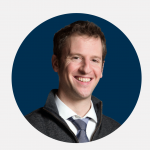 . . . Rami Strosberg, Director, Yachad Israel. Rami’s main areas of focus will be on strategy for growth in Israel, supervision of professional staff and volunteers, and developing relationships with Yachad members, their families and the yeshivot and seminaries in Israel. Rami earned a bachelor’s in psychology at Yeshiva University, followed by a master’s in Jewish education from YU’s Azrieli Graduate School of Jewish Education and semichah from YU’s Rabbi Isaac Elchanan Theological Seminary. Rami served most recently as the Founding Head of School at Westchester Torah Academy.
. . . Rami Strosberg, Director, Yachad Israel. Rami’s main areas of focus will be on strategy for growth in Israel, supervision of professional staff and volunteers, and developing relationships with Yachad members, their families and the yeshivot and seminaries in Israel. Rami earned a bachelor’s in psychology at Yeshiva University, followed by a master’s in Jewish education from YU’s Azrieli Graduate School of Jewish Education and semichah from YU’s Rabbi Isaac Elchanan Theological Seminary. Rami served most recently as the Founding Head of School at Westchester Torah Academy.
Congratulations to…
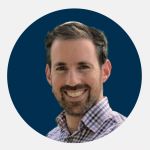 . . . Yoel Sterman on his new role as Director of Development, Yachad Israel. Yoel previously served as Director of Yachad Israel.
. . . Yoel Sterman on his new role as Director of Development, Yachad Israel. Yoel previously served as Director of Yachad Israel.
NEW FROM OU PRESS
Edited by Rabbi Menachem Genack
OU Press and Maggid Books
The Haggadah and the Passover story were themes the Rav, Rabbi Joseph B. Soloveitchik, returned to time and again in his decades of teaching and writing. Haggadat Mesorat HaRav, based on the English Haggadah The Seder Night: An Exalted Evening, presents a comprehensive commentary of the Rav on the Haggadah for the first time in Hebrew. The commentary includes additional insights of the Rav not present in the English edition. Drawing from the entire corpus of Rabbi Soloveitchik’s writings and lectures as well as from published Hebrew works of the Rav and newly translated material, Haggadat Mesorat HaRav was expertly edited by the Rav’s devoted student Rabbi Menachem Genack. The result is a highly readable and literate Hebrew commentary.
One of the teachings contained within this Haggadah adds the historical backdrop to a chiddush known from the work of the Rav’s uncle, Rabbi Yitzchak Zev Soloveitchik, the Brisker Rav. The Brisker Rav explained that there are two components to the Four Cups at the Seder: the recitation of blessings over the cups and the demonstration of freedom that drinking them represents. Haggadat Mesorat HaRav relates that this chiddush was developed by the Brisker Rav and the Rav’s father, Rabbi Moshe Soloveitchik, during World War I, when the two brothers spent Pesach together at Rabbi Moshe’s home in Chaslavitch. Due to the war, there was not enough wine available for each of those present to drink four cups, and the question arose as to the best method to fulfill the mitzvah. The two brothers discussed the question, and with their characteristic acuity came up with a new understanding of the constituent parts of the mitzvah of the Four Cups.
The Rav was a link in a glorious tradition, as the above anecdote demonstrates, but he was also a highly innovative thinker who built upon the teachings of his forebears and developed his own profound philosophy. Haggadat Mesorat HaRav offers a glimpse into the originality and brilliance of the Rav’s teachings as he uncovers new dimensions of meaning and significance in the Haggadah.
COMING SOON FROM OU PRESS
The Crowns on the Letters: Essays on Aggada and the Lives of the Sages
By Rabbi Ari D. Kahn
OU Press
Rabbi Ari Kahn’s The Crowns on the Letters represents a major achievement in the study of the lives of our Sages, as well as in the study of rabbinic Aggada. This work is an immensely learned and deeply creative interpretation of many fundamental aggadot relating to the intellectual biographies of the Tannaim and Amoraim, including Hillel and Shammai, Rabbi Akiva and Rabbi Shimon bar Yochai, Resh Lakish and Rabbi Yochanan, and many others. Additionally, it covers aggadot dealing with major themes in Jewish thought, including the nature of the Oral Law, mysticism and its perils, the messianic era, teshuvah and Eretz Yisrael.
Rabbi Kahn presents close readings of Talmudic and Midrashic sources about events in the lives of the Sages, together with the gamut of interpretations, especially those of Kabbalistic and Chassidic commentators, to arrive at original and compelling conclusions. His insights shed light on the Talmudic narrative as well as on broader philosophical questions. The title of the book is drawn from the well-known episode in which Moshe Rabbeinu is brought to Rabbi Akiva’s study hall to witness the latter’s interpretation of the “crowns” God has tied to the letters of the Torah. Basing himself on the works of the kabbalist Rabbi Isaac Luria and others, Rabbi Kahn delivers a tour de force addressing the interconnected lives of Moshe Rabbeinu and Rabbi Akiva, the relationship between tradition and creativity, and the question of theodicy raised by Rabbi Akiva’s death. Other chapters similarly engage such fundamental issues through the lens of the lives of the Sages.
In fact, one insight which emerges from this work is the interconnectedness of these two realms: Jewish thought as expressed in the Aggada, and the lives of the Sages. Rabbi Kahn’s work suggests that understanding the Torah of the Sages requires understanding their lives and personalities because the Torah they revealed was rooted in their souls. Full Hebrew sources are included to enable readers to study the source material on their own. For all those interested in rabbinic lives and rabbinic Aggada, The Crowns on the Letters is essential reading.

